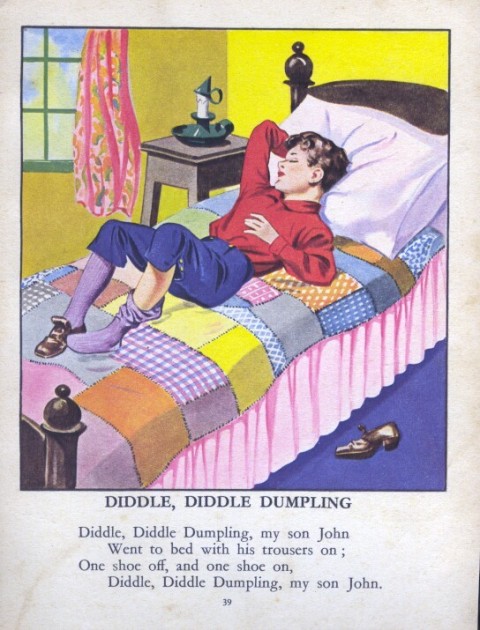Goosey Goosey Gander
June 27, 2012 § 2 Comments
Goosey goosey gander, whither shall I wander,
Upstairs and downstairs, in my lady’s chamber,
There I met an old man who wouldn’t say his prayers,
So I took him by the left leg and threw him down the stairs.
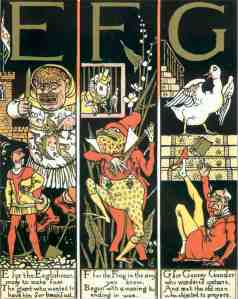
G is for ‘Goosey Gander’ – a wondeful illustration from Walter Crane’s ‘The Absurd ABC‘ – he really is being chucked down the stairs! [E is for the ‘Englishman’ of the FEE FI FO FUM I smell the blood of an englishman rhyme and I will have to post the song about the Frog he would a wooing go – it is a great tune.]
I think this fits in the category of pretty bizarre as rhymes go, though reading up on it in the The Oxford Dictionary of Nursery Rhymes I find it could be an amalgamation of a couple of rhymes. One refers to pulling the legs of a daddy long legs and throwing it down the stairs which make more sense. It is a nice example of how repetition over time can introduce nonsenses into little vignettes of everyday life.
It first appears in print in a wonderful book ‘Gammer Gurton’s Garland or The Nursery Parnassus‘ which has a wonderful sub-title ‘A Choice Collection of Pretty Songs and Verses for the Amusement of all Little Good Children who can neither Read nor Run’!
Oh dear what can the matter be!
May 16, 2012 § Leave a comment
Oh dear, what can the matter be?
Dear dear, what can the matter be?
Oh dear, what can the matter be?
Johnny’s so long at the fair.
He promised he’d buy me a fairing would please me,
And then for a kiss oh he vowed he would tease me,
He promised he’d buy me a bunch of blue ribbons,
To tie up my bonnie brown hair.
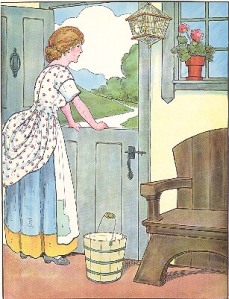
This girl in a 1916 illustration by Blanche Fisher Wright has the wistfulness I get from this song. It may have originated as a Scots song, in the late 1700s. It would make a lovely pairing with ‘My bonny lies over the ocean’, which I guess also has Scots origin. According to my Oxford Book of Nursery Rhymes, there are more verses, and in fact a more nursery version – but I don’t think it fits well to the tune – or not the one I know at any rate. I like it none the less and can see myself chanting it as I try to get my kids dressed!
Jonny shall have a new bonnet,
And Jonny shall go to the fair,
And Jonny shall have a blue ribbon
To tie up his bonny brown hair.
…..
And here’s a leg for a stocking,
And here’s a leg for shoe,
And he has a kiss for his daddy,
And two for his mammy, I trow.
Curly locks curly locks
March 25, 2012 § Leave a comment
Curly locks, curly locks wilt though be mine,
Though shalt not wash dishes, nor yet feed the swine,
But sit on a cushion and sew a fine seam,
And dine upon strawberries, sugar and cream.
I’m not sure there are many ladies around today that sit around on cushions sewing fine seams and eating strawberries and cream!
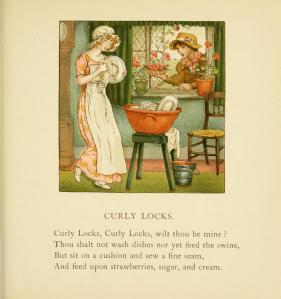
This illustration is from a lovely book by Kate Greenaway – another illustrator I love – called The April Baby’s Book of Tunes. It is a whole story discussing the rhymes and what is known about them. Bearing in mind this was written in 1900:
“Perhaps she did marry him, and is sitting to this day on her cushion, and has grown dreadfully fat through never moving and eating so much sugar and cream, and hasn’t even the energy to curl her hair any more.”
All the current exhortations to exercise and eat healthily, and the dangers of obesity really chime with this, though perhaps those messages are couched rather more positively these days!?
The book also shows that these ryhmes are often set to different tunes.
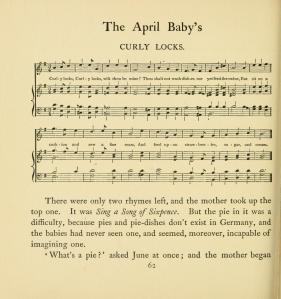
(perhaps tunes will be less diverse these days with easy music reproduction and distribution?)
Sing a song of sixpence
March 21, 2012 § Leave a comment
Sing a song of sixpence, a pocket full of rye,
Four and twenty blackbirds baked in a pie,
And when the pie was opened, the birds began to sing,
Now wasn’t that a dainty dish to set before the king.
The king was in his counting house, counting out his money,
The queen was in her parlour, eating bread and honey,
The maid was in the garden, hanging out the clothes,
When along came a blackbird and pecked off her nose.
Never fails to tickle the little ones as their noses are ‘pecked’ off. I was amused to find from another Nursery Rhymes website that on the BBC’s Listen with Mother in the 1950s they used to add the following to the end of the rhyme:
“There was such a commotion that little Jenny Wren
Flew down from the tree tops and popped it on again”
Though it doesn’t sing so well to the tune I know.

This lovely illustration again by Walter Crane, from a beautiful book that is called ‘The Sing a Song of Sixpence Picture Book’ and has an illustration for each line of the ryhme.
The idea of birds singing inside a pie is also an idea worth exploring – as Heston Blumental did, by making a pie with homing pigeons in his Medieval Feast on Channel 4 a few years ago.
Mary Mary Quite Contrary
March 21, 2012 § Leave a comment
Mary, mary, quite contrary,
How does your garden grow?
With silver bells and cockle shells,
And pretty maids all in a row.

This amazing illustration by W W Denslow quite accurately depicts the bizarreness of this little ditty, note the cheeky smiles on the bells and cockle shells. I have been singing it in the context of a theme of growing things, the kids like the idea of little people popping up in their garden!
Historically there are possible religious implications and a possible connection with Mary Queen of Scots, but it is only conjecture, as the first print version of this is in the mid 1700s, some 200 years after Mary Queen of Scots, and also the religious upheavals of the Stuart era.

Savez vous plantez les choux
February 24, 2012 § Leave a comment
Savez-vous plantez les choux
À la mode, à la mode?
Savez-vous plantez les choux
À la mode de chez nous?
On les plante avec la main,
À la mode, à la mode?
On les plante avec la main,
À la mode de chez nous!
On les plante avec la tête,
À la mode, à la mode?
On les plante avec la tête,
À la mode de chez nous!
On les plante avec le doigt,
À la mode, à la mode?
On les plante avec le doigt,
À la mode de chez nous!
On les plante avec le pied,
À la mode, à la mode?
On les plante avec le pied,
À la mode de chez nous!
On les plante avec le nez,
À la mode, à la mode?
On les plante avec le nez,
À la mode de chez nous!
A traditional French song about planting cabbages with different parts of your body – plenty of giggles to be had! I have a version of this in a beautifully illustrated book of French songs by Anne Rockwell some of which I hope to be able to reproduce.
Pop goes the weasel
February 24, 2012 § Leave a comment
Up and down the city road,
In and out the eagle,
That’s the way the money goes,
Pop goes the weasel.
Half a pound of tupenny rice,
Half a pound of treacle,
That’s the way the money goes,
Pop goes the weasel.
A tune that ‘pops’ up everywhere – we have a jack in the box that plays it, and pops at the right moment, as you’d expect. These lyrics are the ones I know, but there are all sorts of other options out there, perhaps the kids should be making their own up? A version arranged by Charles Twiggs in 1853 is overtly political.
Queen Victoria’s very sick
Napoleon’s got the measels
Sebastopol is won at last
Pop goes the weasel.
Singing in motion
February 3, 2012 § Leave a comment
I’m going to sing with a new nursery class tomorrow morning, where I don’t have the novelty factor of being someones mum, so I’m really interested to see how they respond. I’ve been looking back over my old song planners and wondering which will be the best for them. I think one on a theme of transport (I’ve yet to actually find out what their theme for the term is) will do..
watch 3 different people arriving by horse
1. Ride a cock horse to Banbury Cross (bells)
2. Yankee doodle came to town (feather)
3. She’ll be coming round the mountain (pink pajamas)
now we can get on our horses..
4. Trot trot trot
5. Horsey horsey don’t you stop
6. Mummy and daddy and aunty con
oh dear fallen off.. get on a bus?
8. The wheels on the bus go round and round
9. Londons burning
we better get in a boat to get away from the fire
10. Row row row your boat
11. Dans la riviere
now we look up to the sky and things that are flying around
12. 5 little men in a flying saucer
13. Here is a beehive
14. Twinkle twinkle..
Diddle diddle dumpling, my son John
January 25, 2012 § Leave a comment
Diddle, diddle, dumpling, my son John
Went to bed with his trousers on;
One shoe off, and one shoe on,
Diddle, diddle, dumpling, my son John.
A lovely bit of nonsense! The Oxford Dictionary of Nursery Rhymes suggests this one was well known at the turn of the 1800s, though in those days John wore breeches rather than trousers, or perhaps even stockings, and maybe boots rather than shoes? Might be a good rhyme to illustrate how clothing has changed through the ages. The above illustration is probably from the 1930s when boys wore short trousers!
Dinosaurs and more..
January 25, 2012 § Leave a comment
Reception’s theme for the term is Dinosaurs, which presents a problem in terms of older traditional songs as the visual representations of dinosaurs has only recently entered our popular lexicon.
So.. I have a lovely book called ‘Dinosaur Roar’ by Kaye Urmansky and illustrated by Nick Sharratt which has a dinosaur version of ‘1 2 3 4 5, once I caught a fish alive’
But I’m starting with today’s animals, and how different animals look to each other in scale, a fly looks small to us, but to the fly we look enormous? Would we look like flies to a dinosaur?!
1. Incey Wincey Spider (small spider)
2. There was an old lady who swallowed a fly (even smaller than a spider but the horse is in the end much bigger than her..)
3. Hickory Dickory Dock (a dinosaur as big as big ben?!)
4. 12345, Once I caught a fish alive (tiny fish, largest animal on the planet is a blue whale.. how does that compare to a dinosaur?)
5. I went to the animal fair (monkeys using an elephant as a slide – dinosaurs have long necks..)
6. Un elephant se balancait (an elephant on a spiders web, would that work?)
Un éléphant qui se balançait
se balançait sur une toile d’araignée
Et comme il trouvait ça très amusant
Il fit venir un deuxième éléphant
Deux éléphants qui se balançaient
se balançaient sur une toile d’araignée
Et comme ils trouvaient ça très amusant
Ils firent venir un troisième éléphant
Trois éléphants qui se balançaient
se balançaient sur une toile d’araignée
Et comme ils trouvaient ça très amusant
Ils firent venir un dernier éléphant
6. The elephant goes like this, like that, OR The wooly mammoth goes like this, like that, OR The dinosaur goes like this…
7. Five little dinosaurs bouncing on the bed
8. Down in the forest where nobody goes..
Theres the most enormous dinosaur washing his clothes…
There’s a big fat dinosaur having a doze…
There’s a medium-sized dinosaur blowing his nose…
Theres a tiny little dinosaur smelling rose…
9. 12345 five fat dinosaurs take a dive, 678910 time to fill the swamp again
10. The prehistoric animal brigade (get up and stomp around!)
